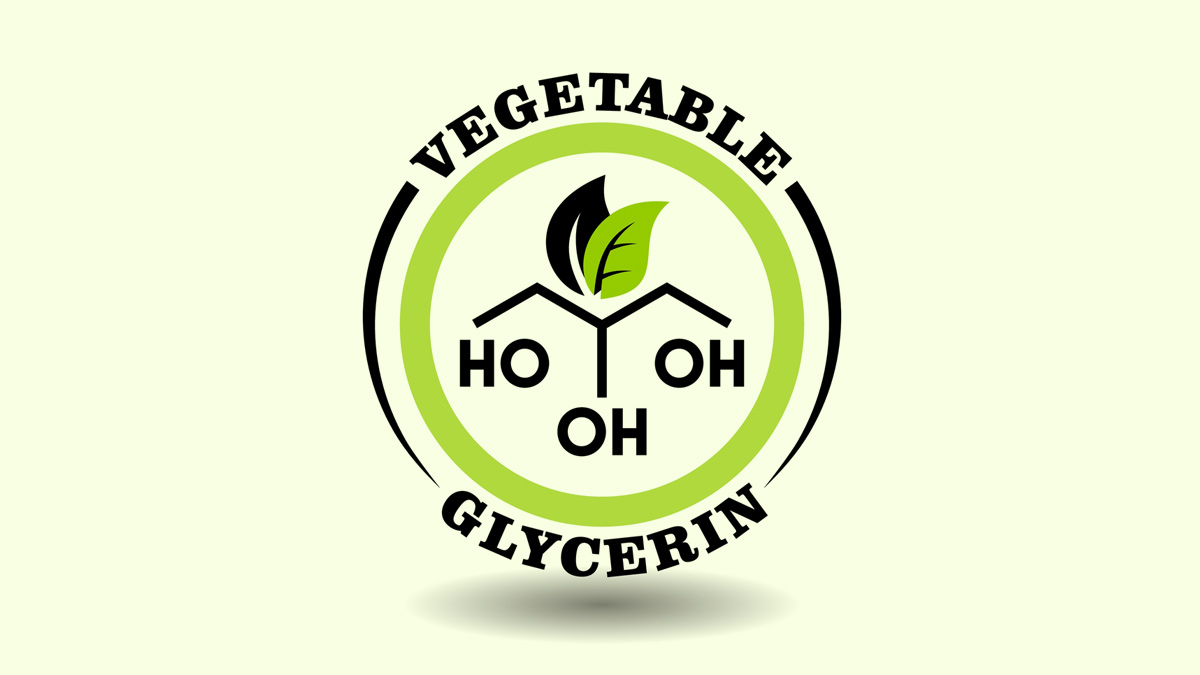
Have you ever wondered what goes into the products you use every day, from the soothing lotions on your skin to the sweet treats you enjoy? One often-overlooked ingredient is vegetable glycerin. This clear, colourless liquid with a gentle sweetness is derived from plant oils like palm, soy, or coconut. It’s found in everything from your favourite skincare products to the snacks in your pantry. But what exactly is vegetable glycerin, and why is it so important? In this article, we list the uses, benefits, and potential side effects of vegetable glycerin to help you understand its role in daily products and its impact on health.
Table of Content:-
What is Vegetable Glycerin?

Vegetable glycerin is a type of sugar alcohol, a naturally occurring substance that has a wide range of applications. It’s created through the hydrolysis process, where plant oils are broken down into glycerin and fatty acids. This compound is hygroscopic, meaning it attracts and retains moisture, which is why it’s commonly found in products designed to hydrate and moisturise.
Uses of Vegetable Glycerin
1. Skincare and Personal Care Products

Vegetable glycerin is a popular ingredient in skincare products due to its moisturising properties. It’s used in lotions, creams, and serums to help retain moisture in the skin, preventing dryness and irritation. Its gentle nature makes it suitable for sensitive skin and use in facial cleansers and eye creams.
2. Food and Beverages
Vegetable glycerin is a versatile ingredient in the food industry. It's a natural sweetener that adds a touch of sweetness without the calories of sugar. Plus, it acts as a humectant, helping foods and drinks retain moisture. You'll often find it in baked goods, candies, and soft drinks where it keeps products fresh, prevents dryness, and improves texture.
Also Read: Glycerine For Skincare: Here's How It Can Be Your Skin's Best Friend
3. Pharmaceutical Products
Vegetable glycerin serves as a base for many pharmaceutical preparations, including syrups and cough medicines. It acts as a solvent, helping to dissolve other ingredients and make them easier to administer. Its soothing properties also make it useful in formulations for sore throats and dry coughs.
Benefits of Vegetable Glycerin
1. Moisturising Properties

Vegetable glycerin is a hydration hero for your skin. It draws water from the environment into the skin and helps maintain hydration. This makes it an excellent choice for dry and sensitive skin types. Glycerin can also offer relief for conditions like eczema and psoriasis by helping maintain your skin's natural barrier.
Compared to silicone oil and hyaluronic acid creams, glycerin cream demonstrated greater effectiveness in hydrating the skin and preserving its moisture barrier in a 2013 study.
2. Gentle on the Skin
Vegetable glycerin is known for being gentle and non-irritating, which makes it suitable for use in products designed for sensitive skin. Unlike some other moisturisers that can cause allergic reactions or sensitivities, vegetable glycerin is generally well-tolerated. According to a 2018 study, vegetable glycerin can act as a protective shield, shielding your skin from harsh weather conditions like wind and cold.
3. Low Caloric Sweetener
As a sweetener, vegetable glycerin provides a lower-calorie alternative to sugar. It has a sweet taste but contains fewer calories per gram compared to traditional sugar. This makes it a useful option for people looking to reduce their caloric intake without sacrificing sweetness.
4. Preservative Qualities
Vegetable glycerin has natural preservative qualities due to its hygroscopic nature. It helps prevent microbial growth in products, extending their shelf life. This is particularly beneficial in cosmetics and pharmaceuticals, where long-term stability is essential.
Also Read: Hair Care: How To Use Glycerine For Hair And Scalp Health
Potential Side Effects of Vegetable Glycerin
1. Digestive Issues

While vegetable glycerin is generally considered safe for consumption, excessive intake can lead to digestive issues. It may cause gastrointestinal discomfort, including bloating, gas, and diarrhoea. This is particularly true when consumed in large quantities or in products that contain high levels of glycerin.
2. Allergic Reactions
Although rare, some individuals may experience allergic reactions to vegetable glycerin. You may experience redness, itching, or swelling where the product is applied. If you notice any unusual reactions, stop using the product and consult a healthcare professional.
3. Impact on Blood Sugar Levels
Vegetable glycerin, while having a lower glycemic index compared to sugar, can still affect blood sugar levels. People with diabetes or those monitoring their blood sugar should be cautious with products containing glycerin and consult with their healthcare provider regarding its impact.
[Disclaimer: This article contains information for informational purposes only, hence, we advise you to consult your own professional if you are dealing with any health issues to avoid complications.]
Also watch this video
How we keep this article up to date:
We work with experts and keep a close eye on the latest in health and wellness. Whenever there is a new research or helpful information, we update our articles with accurate and useful advice.
Current Version